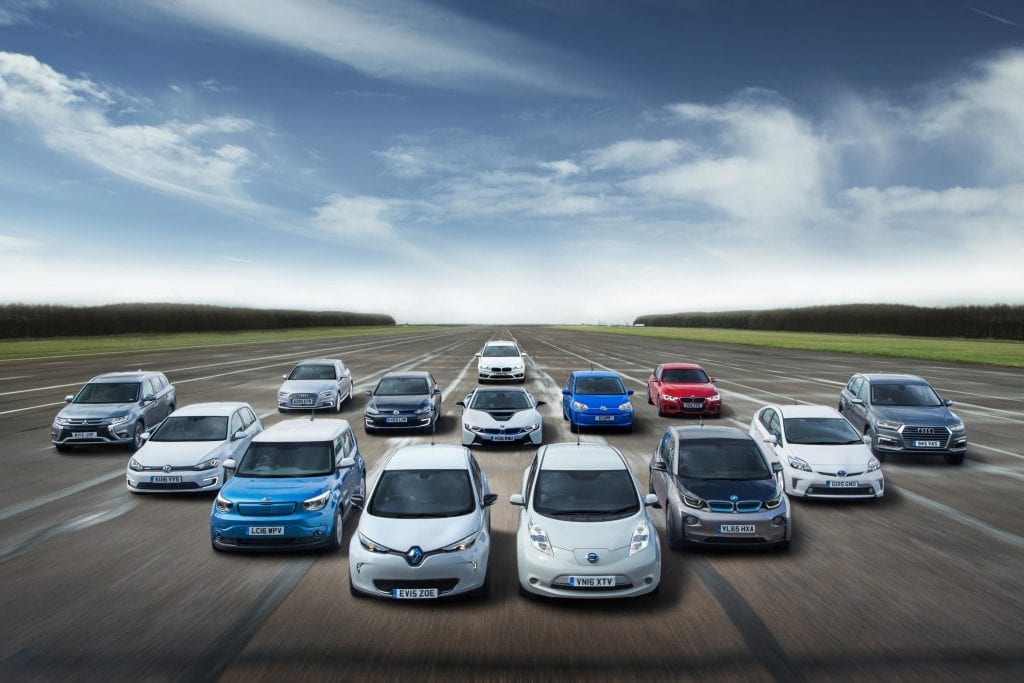
The number of plug-in electric cars on British roads grew by three quarters last year, according to new Motorparc data released today by the Society of Motor Manufacturers and Traders (SMMT).
The UK’s largest automotive analysis shows there is now a record 195,410 plug-in vehicles on our roads, reflecting the growing choice of models now on offer. Overall ownership of alternatively fuelled vehicles (AFVs) increased by almost 30% last year, with more than 620,000 hybrid, plug-in hybrid, and battery electric cars now in use.
The electric vehicle market is going to expand significantly in the coming years, with models from Audi and Mercedes-Benz hitting the roads in the next 12 months, while companies such as Volkswagen Group and planning mass model launches by 2023.
As drivers take advantage of the latest low emission vehicle technology – whether petrol, diesel or AFV, average CO2 emissions for the UK Motorparc have fallen to the lowest on record, down 17.8% compared with 2008. Thanks to manufacturer investment in advanced powertrains, transmission types, lightweight materials and aerodynamics, cars are more efficient than ever before and drivers are seeing the benefits.
The UK’s record 34.9 million-strong car fleet has never been more diverse, with more than 1,600 model ranges and almost 68,000 different specifications on the roads last year. While superminis continued to dominate, making up a third (33.2%) of all cars in the parc, dual purpose vehicles saw the biggest growth, up 10.6%. At the same time, family hatches and saloons (upper medium) saw the largest fall, down 4.7% to four million.
Meanwhile, the colours of Britain’s cars closely follows trends seen in the new car market, with black coming top, knocking silver off the top spot. More than seven million (20.1%) cars on the road are black, closely followed by silver and, in third place, blue.
Elsewhere, the data reveals that female car ownership remains at a record high, surpassing 2017’s level by 1.4%, with more than 12 million cars now owned by women. Cars registered to men also rose moderately by 0.5% to almost 17.9 million.
Mike Hawes, SMMT Chief Executive, said, “Thanks to massive investment from manufacturers in delivering a wide range of models across all fuel types, to suit all driving needs, environmental gains are now being delivered across the UK. Ever-more advanced in technology makes every new generation of vehicle more efficient than the last, and this is filtering rapidly from the new car market into the broader parc. Fleet renewal is proven to work so we need a world-class package of incentives and infrastructure to give motorists the confidence to buy the latest, cleanest cars, whatever the fuel type, in the greater numbers we need to meet environmental challenges.”
Interesting stats…
- While both men and women own more petrol cars than any other fuel type, for companies, diesel is the preferred choice given its lower CO2 and better fuel economy.
- The 10,642 battery electric cars owned by women make up a fifth of those on UK roads, growing by 31.7% year-on-year.
- Plug-in hybrids grew in popularity with both male and female drivers, growing by 98.3% and 101.1% respectively, compared with the year before.
- The average new or updated car model emits 8.3% less CO2 than the model it replaced, highlighting the importance of fleet renewal.
- In 2018, the most common cars on UK roads were the Ford Fiesta (1.6 million), Ford Focus (1.3 million) and Vauxhall Corsa (1.2 million).
- There are 3.9 million Dual Purpose vehicles in use in Britain, edging closer to the four million small family cars (upper medium) on UK roads.
- Superminis remain the biggest segment and are most popular with women, accounting for 48.8% of female ownership. Small family cars, meanwhile, are most favoured by men (27.4%).
- You’re more likely to see a black car in the UK than any other, with seven million of them on the road. Women’s tastes follow the national trend, while men are more likely to choose silver.




You must be logged in to post a comment.